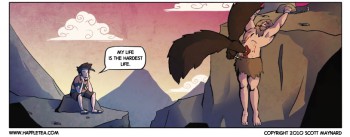Spotlight on Fantasy Webcomics: Happletea‘s Spin on Mythology and Pop Culture

The majority of webcomics I read are ongoing stories, most with fantasy elements, that focus on character development and plot and world building. Happletea is the only gag strip in my feed, and while it doesn’t have those other elements, it brings both humor and insight in spades. Created by Scott Maynard, the strip has been going since 2008 with some regularity (though not consistent updates), and it is, according to Maynard, “the only comic that excoriates religion, pop culture, and politics while, at the same time, lauding the world of cryptozoology.” I use Maynard’s own description here because it’s not only accurate (I can’t think of another comparable comic, except very possibly Sinfest, which I read only on occasion), but because it captures Maynard’s sense of humor.
In Maynard’s strip, recurring characters include:
- Lil K, whose misadventures have included pre-looting for the Mayan apocalypse, starting a revolution in Latin America upon misunderstanding what New Year’s Resolutions were for, and coping with the chaos of New York
- Sasquatch, Lil K’s foster father, who packs wormy lunches and occasionally has bizarre fashion sense
- God, who takes the form of a cat living at Lil K’s house
- Allev, Lil K’s blond friend who is often the voice of reason against Lil K’s antics
Along with that cast are a host of mythological figures from around the world. Nothing is sacred in this comic — not Christianity, Buddhism, or Hinduism, and certainly not Celtic, Norse, Chinese, or Egyptian mythology. And that’s where the fun comes in. Maynard has a knack of poking fun at religions as though they’re mythology and vice versa. At my home blog, I’ve written a number of entries about the interplay between myth, religion, fairy tales, and folklore, and Maynard’s lampooning of all of those topics — as well as more modern conspiracy theories, like crystal skulls — is utterly enjoyable. While he treats them all with irreverence, it’s clear from the blog posts he writes that part of the humor comes from his own appreciation of the mythological elements.
It’s also clear from the posts just how much Maynard knows about mythology. While some of the strips, like a comic where a grandfather is explaining to his grandson that thunder comes from Thor (with a punchline of Thor belching) need no explanation, others require a little more background. In a strip referencing the long revenge of the fairy folk, Maynard gave a full-on (yet brief) synopsis of Conary Mor, a tale of love, betrayal, rebirth, and revenge from the Irish canon. After explaining the ins and outs of intergenerational conflict between families, Maynard summed up the lesson: “Faerie folk are much bigger jerks than pop culture would have you believe.”
He’s also not afraid to post about his lack of knowledge. Maynard makes references to Hinduism on occasion, but always with disclaimers that his knowledge of the religion is imperfect. In a comic referencing totems and clan structure, drawn from Ojibwe culture, Maynard posted about how interested he is in learning more about Native American mythology, and how widespread and diverse the folklore native to North America is — a distinction that often gets missed when people talk about “Native American mythology” as though it’s monolithic, rather than a wide array of different cultures and legends.

Both the commentary and the comics feature language that is not always safe for work (depending on your work zone), and the jokes are very occasionally political or potentially offensive to a sensitive readership. (Lil K at one point tortures a pig in a strip referencing the Bay of Pigs; a chupacabra is clearly out to take American jobs; a man who’s gone to Purgatory being told his afterlife will consist of being converted to Mormonism, to which he promptly asks if they’re sure this isn’t Hell.) As with many gag strips, not every joke will work for every reader. But over the five years Maynard has been posting the comic, he’s accumulated an excellent variety of strips. If you’re interested in mythology, folklore, or even the occasional Lord of the Rings gag, you should definitely give it a try.
Have other comics you’d like to see covered in this column? Tell me in the comments.
Alana Joli Abbott is a reviewer and game writer, whose multiple choice novels Choice of Kung Fu and Showdown at Willow Creek are published by Choice of Games. She is the author of three novels (one recently funded by Kickstarter), several short stories, and a contributor to role playing games. You can find her online at VirgilandBeatrice.com.